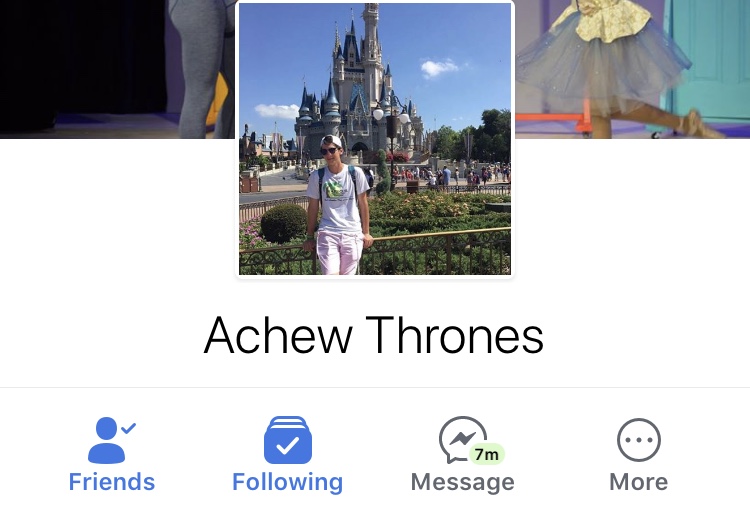Seniors change Facebook names for fun, privacy despite colleges not checking
Senior Matthew Rones changed his Facebook name to “Achew Thrones.” Rones is part of a trend of seniors changing names to preserve privacy and follow tradition. Screenshot by Rebecca Hirsh.
March 3, 2018
A class of 32 seniors stares blankly as the teacher calls out the students’ given names from the attendance sheet. An average of three of those students, however, go by a different name on Facebook than what they respond to in class, based on data from a Black & White count of the Whitman Class of 2018 Facebook group. Matthew Rones logs on under the pseudonym Achew Thrones, Sofia Luzuriaga under Sofia Marisol and Owen Roegge under Owen Sourmango.
Every year, high school seniors change their names on social media—most commonly Facebook—in part to avoid colleges reviewing their profiles during the application process. About ten percent of the 393 members of the Facebook group changed their names, usually swapping in their middle name for their last name or creating a pun.
For many students, the tradition is a way to get creative with names and inside jokes with friends, senior Owen Roegge said.
But for others, changing their name on Facebook is a way to preserve privacy, even if the student doesn’t have anything particularly personal on their wall.
“I don’t have anything inappropriate on my Facebook, but I still wouldn’t want colleges to see my posts and judge my character or stereotype me,” Luzuriaga said. “It probably makes no difference but you can never be too safe, especially if you have some risky photos on your wall.”
Information and photos posted on one’s Facebook wall are available to the public in varying degrees depending on the user’s settings. Because it’s easily accessible, students fear colleges will take into account their social media profiles when considering their admissions decision, especially in a small pool of applicants for specific programs, Rones said.
Despite the worry, colleges and universities generally don’t review students’ profiles due to short admissions timeframes, associate director of admissions at Middlebury College Sam Prouty said.
“Changes in names don’t affect things and we usually don’t notice. When reading applications, we do not have the time to take a detour into someone’s Facebook,” Prouty said. “We rely on what students share with us. We don’t go digging beyond what an applicant presents in his or her application.”
Many students feel that Facebook pages are poor indicators of character and therefore shouldn’t be considered in the application process.
“Posts are limited to homecoming, prom, bRAVE, your political views, taste in music and places you’ve traveled,” Rones said. “Very few kids are going to put up the stuff they do when nobody’s watching.”










